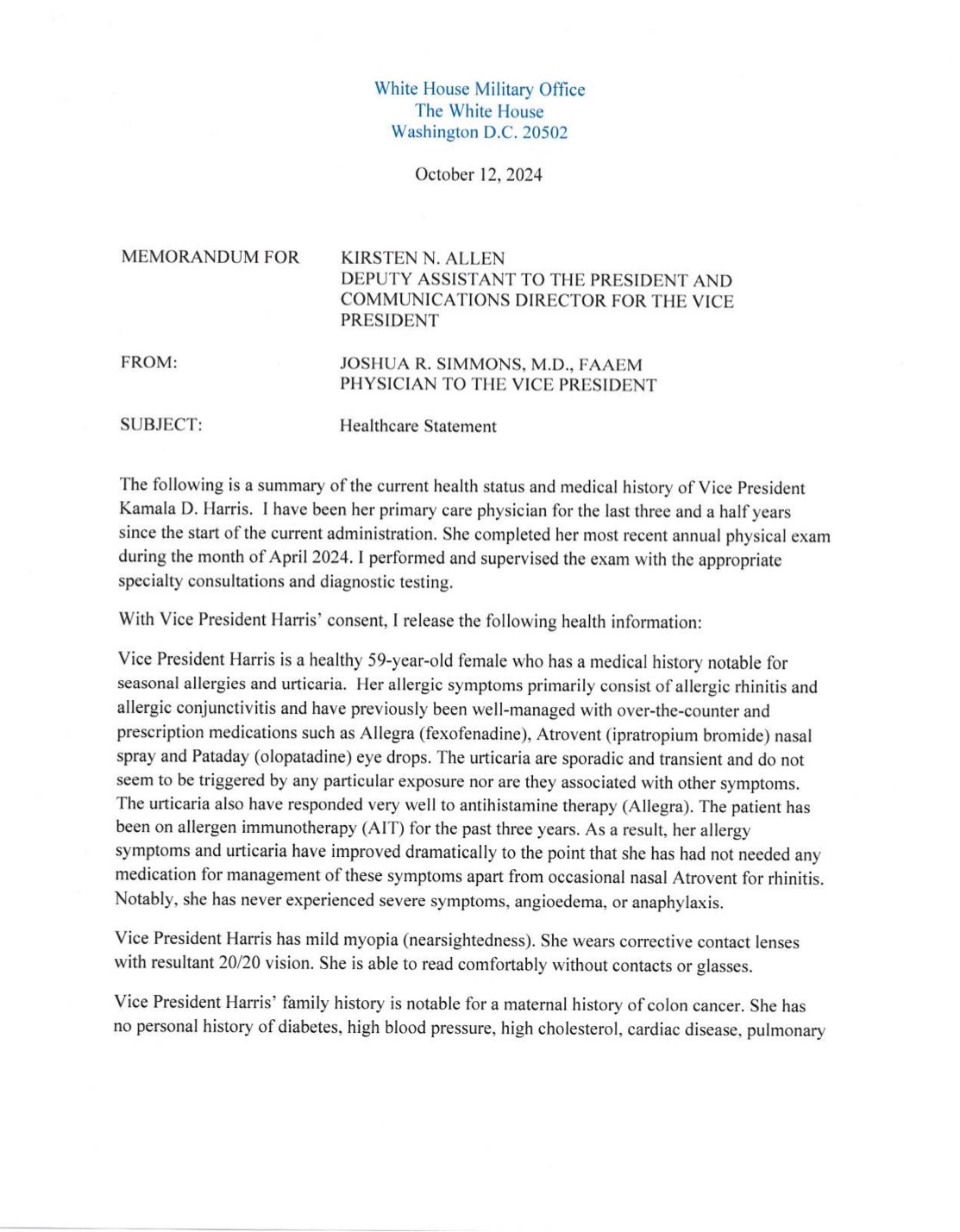In a bold move aimed at showcasing her fitness for the presidency, U.S. Vice President and Democratic presidential candidate Kamala Harris released a comprehensive medical report on Saturday, declaring herself in “excellent health.” This strategic disclosure serves as a direct challenge to her rival, Donald Trump, whom Harris has publicly criticized for his lack of transparency regarding his own medical history. The stakes are high as the nation heads toward a contentious election, with Trump becoming the oldest presidential nominee from a major political party in U.S. history after President Joe Biden exited the race in July.
According to the medical report released by the White House, Dr. Joshua Simmons, Harris’s physician, confirmed that she “remains in excellent health,” emphasizing her ability to handle the demands of the presidency both physically and mentally. “Vice President Harris possesses the physical and mental resiliency required to successfully execute the duties of the presidency,” Simmons stated in the report, highlighting the importance of mental acuity in leadership roles, especially in today’s complex political climate.
During a press conference held ahead of her trip to North Carolina, Harris seized the opportunity to question Trump’s reluctance to share his medical records. She labeled his failure to disclose such critical information as indicative of a broader issue: a lack of transparency that the American public deserves. “It’s obvious that his team, at least, does not want the American people to see everything about who he is… and whether or not he is actually fit to do the job of being president of the United States,” she asserted, positioning herself as a candidate who values openness and accountability.
In response to Harris’s remarks, Trump’s campaign quickly countered, asserting that the former president is also “in perfect and excellent health to be Commander in Chief.” They further claimed that Harris lacks the strength and vigor necessary to lead the nation effectively. This exchange highlights the ongoing tensions between the candidates as they vie for public support in an increasingly polarized political environment.
Harris’s most recent medical examination, which took place in April, returned “unremarkable” results, according to Dr. Simmons. However, the report did note that she experiences seasonal allergies and hives, conditions that are managed through a combination of non-prescription and prescription medications. Additionally, the vice president is slightly nearsighted and relies on contact lenses to correct her vision. These details, while seemingly minor, contribute to the narrative of transparency Harris is attempting to build in contrast to her opponent.

With Biden stepping back from the presidential race, the Democratic Party has shifted its focus to Harris, who at 59 is younger than Trump, now 78. Biden’s withdrawal was precipitated by concerns over his mental sharpness following a challenging debate against Trump. The recent political landscape has underscored the significance of age and health in determining voter confidence, although polling suggests that Trump’s age has not deterred his base. Recent surveys indicate a competitive race between Harris and Trump as they prepare for the November 5 election.
In the midst of this political skirmish, Harris’s campaign highlighted a series of investigative reports from The New York Times that scrutinized Trump’s health disclosures. These articles raised alarm bells over his reluctance to provide basic information about his well-being. The Times also analyzed Trump’s speeches, revealing an increasing trend towards lengthy and at times incoherent remarks, which experts interpret as potential signs of cognitive decline.
Despite these concerns, Trump has remained adamant about his fitness for office. On Saturday, his campaign circulated statements from his former physician, Dr. Ronny Jackson, who claimed that Trump was doing “extremely well” following a July incident where a bullet grazed his ear. This assertion was coupled with a more recent endorsement from Dr. Bruce Aronwald, a physician connected to Trump’s golf club, who proclaimed the former president to be in “excellent” health without offering substantial details about his examination.
As the political battle intensifies, Trump’s campaign has pointed out that he maintains an “extremely busy and active campaign schedule,” contrasting it with what they perceive as Harris’s inadequate preparedness for the presidency. Historically, Trump’s medical evaluations have been met with skepticism, with his former doctors making exaggerated claims about his health. In 2015, Dr. Harold Bornstein famously stated that Trump would be “the healthiest individual ever elected to the presidency,” while Jackson speculated in 2018 that with a better diet, Trump could live to be 200.
Looking ahead, should Trump win the upcoming election, he would be 82 by the end of his second term. This looming age factor, alongside health considerations, will undoubtedly play a pivotal role in shaping the narrative of the 2024 presidential race. As both candidates strive to present themselves as the most capable leader, the focus on health and transparency will likely remain a significant theme in the coming months.



